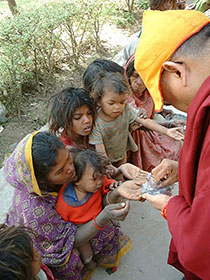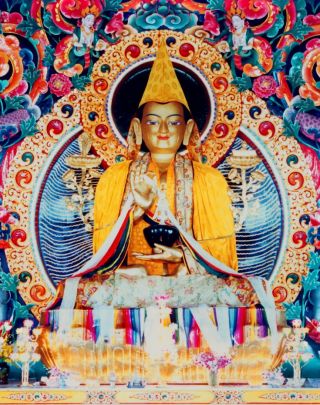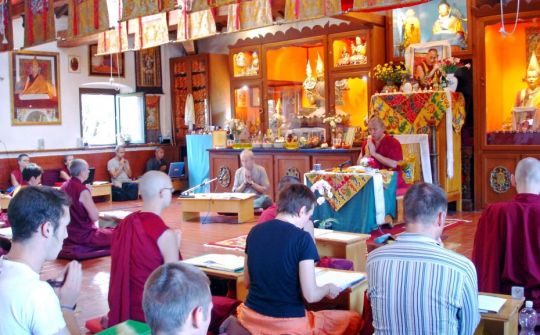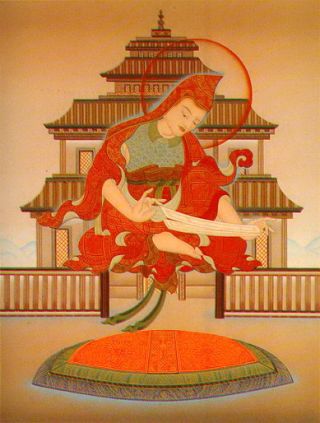- Home
- FPMT Homepage
Foundation for the Preservation of the Mahayana Tradition
The FPMT is an organization devoted to preserving and spreading Mahayana Buddhism worldwide by creating opportunities to listen, reflect, meditate, practice and actualize the unmistaken teachings of the Buddha and based on that experience spreading the Dharma to sentient beings. We provide integrated education through which people’s minds and hearts can be transformed into their highest potential for the benefit of others, inspired by an attitude of universal responsibility and service. We are committed to creating harmonious environments and helping all beings develop their full potential of infinite wisdom and compassion. Our organization is based on the Buddhist tradition of Lama Tsongkhapa of Tibet as taught to us by our founders Lama Thubten Yeshe and Lama Thubten Zopa Rinpoche.
- Willkommen
Die Stiftung zur Erhaltung der Mahayana Tradition (FPMT) ist eine Organisation, die sich weltweit für die Erhaltung und Verbreitung des Mahayana-Buddhismus einsetzt, indem sie Möglichkeiten schafft, den makellosen Lehren des Buddha zuzuhören, über sie zur reflektieren und zu meditieren und auf der Grundlage dieser Erfahrung das Dharma unter den Lebewesen zu verbreiten.
Wir bieten integrierte Schulungswege an, durch denen der Geist und das Herz der Menschen in ihr höchstes Potential verwandelt werden zum Wohl der anderen – inspiriert durch eine Haltung der universellen Verantwortung und dem Wunsch zu dienen. Wir haben uns verpflichtet, harmonische Umgebungen zu schaffen und allen Wesen zu helfen, ihr volles Potenzial unendlicher Weisheit und grenzenlosen Mitgefühls zu verwirklichen.
Unsere Organisation basiert auf der buddhistischen Tradition von Lama Tsongkhapa von Tibet, so wie sie uns von unseren Gründern Lama Thubten Yeshe und Lama Thubten Zopa Rinpoche gelehrt wird.
- Bienvenidos
La Fundación para la preservación de la tradición Mahayana (FPMT) es una organización que se dedica a preservar y difundir el budismo Mahayana en todo el mundo, creando oportunidades para escuchar, reflexionar, meditar, practicar y actualizar las enseñanzas inconfundibles de Buda y en base a esa experiencia difundir el Dharma a los seres.
Proporcionamos una educación integrada a través de la cual las mentes y los corazones de las personas se pueden transformar en su mayor potencial para el beneficio de los demás, inspirados por una actitud de responsabilidad y servicio universales. Estamos comprometidos a crear ambientes armoniosos y ayudar a todos los seres a desarrollar todo su potencial de infinita sabiduría y compasión.
Nuestra organización se basa en la tradición budista de Lama Tsongkhapa del Tíbet como nos lo enseñaron nuestros fundadores Lama Thubten Yeshe y Lama Zopa Rinpoche.
A continuación puede ver una lista de los centros y sus páginas web en su lengua preferida.
- Bienvenue
L’organisation de la FPMT a pour vocation la préservation et la diffusion du bouddhisme du mahayana dans le monde entier. Elle offre l’opportunité d’écouter, de réfléchir, de méditer, de pratiquer et de réaliser les enseignements excellents du Bouddha, pour ensuite transmettre le Dharma à tous les êtres. Nous proposons une formation intégrée grâce à laquelle le cœur et l’esprit de chacun peuvent accomplir leur potentiel le plus élevé pour le bien d’autrui, inspirés par le sens du service et une responsabilité universelle. Nous nous engageons à créer un environnement harmonieux et à aider tous les êtres à épanouir leur potentiel illimité de compassion et de sagesse. Notre organisation s’appuie sur la tradition guéloukpa de Lama Tsongkhapa du Tibet, telle qu’elle a été enseignée par nos fondateurs Lama Thoubtèn Yéshé et Lama Zopa Rinpoché.
Visitez le site de notre Editions Mahayana pour les traductions, conseils et nouvelles du Bureau international en français.
Voici une liste de centres et de leurs sites dans votre langue préférée
- Benvenuto
L’FPMT è un organizzazione il cui scopo è preservare e diffondere il Buddhismo Mahayana nel mondo, creando occasioni di ascolto, riflessione, meditazione e pratica dei perfetti insegnamenti del Buddha, al fine di attualizzare e diffondere il Dharma fra tutti gli esseri senzienti.
Offriamo un’educazione integrata, che può trasformare la mente e i cuori delle persone nel loro massimo potenziale, per il beneficio di tutti gli esseri, ispirati da un’attitudine di responsabilità universale e di servizio.
Il nostro obiettivo è quello di creare contesti armoniosi e aiutare tutti gli esseri a sviluppare in modo completo le proprie potenzialità di infinita saggezza e compassione.
La nostra organizzazione si basa sulla tradizione buddhista di Lama Tsongkhapa del Tibet, così come ci è stata insegnata dai nostri fondatori Lama Thubten Yeshe e Lama Zopa Rinpoche.
Di seguito potete trovare un elenco dei centri e dei loro siti nella lingua da voi prescelta.
- 欢迎 / 歡迎
简体中文
“护持大乘法脉基金会”( 英文简称:FPMT。全名:Foundation for the Preservation of the Mahayana Tradition) 是一个致力于护持和弘扬大乘佛法的国际佛教组织。我们提供听闻,思维,禅修,修行和实证佛陀无误教法的机会,以便让一切众生都能够享受佛法的指引和滋润。
我们全力创造和谐融洽的环境, 为人们提供解行并重的完整佛法教育,以便启发内在的环宇悲心及责任心,并开发内心所蕴藏的巨大潜能 — 无限的智慧与悲心 — 以便利益和服务一切有情。
FPMT的创办人是图腾耶喜喇嘛和喇嘛梭巴仁波切。我们所修习的是由两位上师所教导的,西藏喀巴大师的佛法传承。
繁體中文
護持大乘法脈基金會”( 英文簡稱:FPMT。全名:Found
ation for the Preservation of the Mahayana Tradition ) 是一個致力於護持和弘揚大乘佛法的國際佛教組織。我們提供聽聞, 思維,禪修,修行和實證佛陀無誤教法的機會,以便讓一切眾生都能 夠享受佛法的指引和滋潤。 我們全力創造和諧融洽的環境,
為人們提供解行並重的完整佛法教育,以便啟發內在的環宇悲心及責 任心,並開發內心所蘊藏的巨大潛能 — 無限的智慧與悲心 – – 以便利益和服務一切有情。 FPMT的創辦人是圖騰耶喜喇嘛和喇嘛梭巴仁波切。
我們所修習的是由兩位上師所教導的,西藏喀巴大師的佛法傳承。 察看道场信息:
- FPMT Homepage
- News/Media
-
- Study & Practice
-
-
- About FPMT Education Services
- Latest News
- Programs
- New to Buddhism?
- Buddhist Mind Science: Activating Your Potential
- Heart Advice for Death and Dying
- Discovering Buddhism
- Living in the Path
- Exploring Buddhism
- FPMT Basic Program
- FPMT Masters Program
- FPMT In-Depth Meditation Training
- Maitripa College
- Lotsawa Rinchen Zangpo Translator Program
- Universal Education for Compassion & Wisdom
- Online Learning Center
-
- Prayers & Practice Materials
- Overview of Prayers & Practices
- Full Catalogue of Prayers & Practice Materials
- Explore Popular Topics
- Benefiting Animals
- Chenrezig Resources
- Death & Dying Resources
- Lama Chopa (Guru Puja)
- Lama Zopa Rinpoche: Compendium of Precious Instructions
- Lama Zopa Rinpoche: Life Practice Advice
- Lama Zopa Rinpoche Practice Series
- Lamrim Resources
- Mantras
- Prayer Book Updates
- Purification Practices
- Sutras
- Thought Transformation (Lojong)
- Audio Materials
- Dharma Dates - Tibetan Calendar
- Translation Services
- Publishing Services
- Ways to Offer Support
- Prayers & Practice Materials
-
- Teachings and Advice
- Find Teachings and Advice
- Lama Zopa Rinpoche Advice Page
- Lama Zopa Rinpoche: Compendium of Precious Instructions
- Lama Zopa Rinpoche Video Teachings
- ༧སྐྱབས་རྗེ་བཟོད་པ་རིན་པོ་ཆེ་མཆོག་ནས་སྩལ་བའི་བཀའ་སློབ་བརྙན་འཕྲིན།
- Podcasts
- Lama Yeshe Wisdom Archive
- Buddhism FAQ
- Dharma for Young People
- Resources on Holy Objects
- Teachings and Advice
-
-
*If a menu item has a submenu clicking once will expand the menu clicking twice will open the page.
-
-
- Centers
-
- Teachers
-
- Projects
-
-
-
-
*If a menu item has a submenu clicking once will expand the menu clicking twice will open the page.
-
-
- FPMT
-
-
-
-
-
According to the Buddhist view, there is no human problem that cannot be solved by human beings.
Lama Thubten Yeshe
-
-
-
- Shop
-
-
-
The Foundation Store is FPMT’s online shop and features a vast selection of Buddhist study and practice materials written or recommended by our lineage gurus. These items include homestudy programs, prayers and practices in PDF or eBook format, materials for children, and other resources to support practitioners.
Items displayed in the shop are made available for Dharma practice and educational purposes, and never for the purpose of profiting from their sale. Please read FPMT Foundation Store Policy Regarding Dharma Items for more information.
-
-
FPMT Basic Program
The FPMT Basic Program Online |
The FPMT Basic Program Subjects | Centers Offering the FPMT Basic Program
The FPMT Basic Program in Buddhist Studies of Sutra and Tantra (BP) is a five-year, twelve-subject course of studies designed by Lama Zopa Rinpoche. It provides a practice-oriented transmission of the Buddhadharma to committed students ready to progress to in-depth study and practice.
Some of Tibetan Buddhism’s most treasured texts form the heart of the program. Je Tsongkhapa’s Middle Length Lamrim; Shantideva’s Bodhisattvacharyavatara; the Heart Sutra; Jetsun Chokyi Gyaltsen’s Tenets; Maitreya’s Ornament for Clear Realization and Tathagata Essence; the Wheel of Sharp Weapons, and other texts guide the practitioner through a comprehensive study of sutra and tantra.
The program’s comprehensive curriculum greatly enhances students’ Dharma understanding, establishing a sound basis for ongoing study, practice, retreat, and service.
FPMT centers worldwide offer the program in a variety of formats. It is also available as an online program.
Learning Dharma means less ignorance and more wisdom. It means more light in your life, no darkness in your mind. It means you have more freedom in your life to achieve liberation from samsara and great enlightenment. The more you understand Dharma, the more you can benefit others.
–Lama Zopa Rinpoche
The FPMT Basic Program in Centers
The FPMT Basic Program is taught by Tibetan geshes and qualified Western teachers. Study of the standard texts and commentaries is supported by discussions, meditations, reading and homework assignments, short retreats, etc.; each subject is completed with a test.
Students may enter the program at the beginning of subjects as indicated by individual centers. Students will benefit most from their BP studies if they have some familiarity with preparatory study and practice as offered by foundational-level programs.
Over the course of their engagement with the BP students must follow the BP Conduct and Practice Criteria: practicing to the best of their ability to refrain from killing, stealing, lying, sexual misconduct (adultery), and intoxicants, while developing awareness of positive and negative states of mind, and, in particular, the practice of patience and concern for others.
Upon fulfillment of the requirements set by the center and having passed the test for a subject, the BP Completion Card, signed off for the completed subject, can be provided to students who leave the program before its conclusion. This facilitates completion at a later time. When at least the nine subjects of the core curriculum are completed, students may participate in the review and final exam.
Three months of lamrim retreat complete the program. The retreat may be done before or after the final exam, but should preferably be done after studying Stages of the Path. Lama Zopa Rinpoche strongly encourages students to do the three-month retreat all at once, but if this is not possible, three separate months of lamrim retreat fulfill the requirement. Several centers are now offering one- or three-month lamrim retreats as part of their BP.
The BP Completion Certificate. is awarded upon completion of the review, final exam, and retreat. BP graduates serve in various roles that support FPMT centers and education programs, by offering introductory level courses, as BP teaching assistants, or as tutors for BP Online for example. Graduates are eligible to enter the FPMT teacher registration process; as registered teachers they teach foundational level FPMT education programs and FPMT Basic Program subjects in FPMT centers upon invitation.
FPMT Education Services provides assistance with offering the program at various levels and in formats suitable for different center situations, Centers wishing to host the FPMT Basic Program will find detailed information in the Guidelines for Implementation , available for download from the BP materials webpage, together with the BP standard texts and commentaries, both in Tibetan and in translation in various languages, and examples of course materials. For more information, please contact the FPMT Basic Program coordinator.
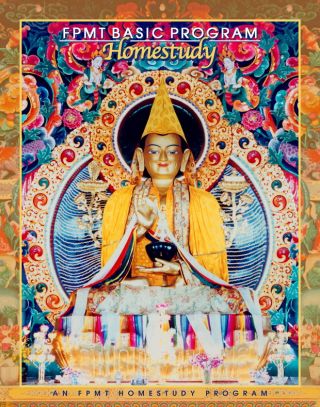
FPMT Basic Program Online
The BP subjects are offered online for those unable to attend the program in an FPMT center. All elements to complete the program are also available online.
The FPMT Online Learning Center offers BP Online by means of video and audio recordings of outstanding BP teachers . The teachings are supplemented by study materials, discussion forums monitored by qualified Western teachers, guided meditations, and retreats. While recommended schedules are provided, students can study at their own pace. Access to individual subjects is available through The Foundation Store.
In sync with their center based Basic Programs, Jamyang Buddist Centre London, UK, Losang Dragpa Centre in Malaysia, Nalanda Monastery in France and Istituto Lama Tzong Khapa in Italy offer BP Online in real time, including the program completion option. BP homestudy packages are available from Chenrezig Institute in Australia.
Students engaging with BP Online at the FPMT Online Learning center can choose to what extent they wish to follow the recommendations regarding program completion. Students may complete any number of subjects and in any order they wish. Recommendations for determining the order of study can be found in the Introduction to BP Online at the FPMT Online Learning Center. Additional details of the program such as completion requirements and suggested prerequisite studies are also presented there. A FAQ page answers common questions about BP Online.
Students are encouraged to consider engaging in all components of the program, including the BP Conduct and Practice Criteria designed by Lama Zopa Rinpoche, at least two half-hour lamrim meditations per week; the subject completion tests and subject-related short retreats, and the one-month lamrim retreat and three-month review and final exam that complete the program.
For students to have the most benefit from their participation in BP Online, experience with Dharma study and meditation practice, and skill in doing individual retreat are needed. Additional requirements apply for the tantra subjects. Please check the preparatory study and practice page to decide if the program is right for you!
To fulfill the retreat requirement for program completion, BP Online students can participate in any of the one-month lamrim retreats that are offered by centers in several regions. For individual one-month lamrim retreats, Guidelines and Support Materials are provided on the FPMT Online Learning Center.
Upon successful completion of the BP subjects, the three-month review and final exam and the one-month lamrim retreat, students are awarded the BP Homestudy Completion Certificate. Graduates of BP Online, while not eligible for FPMT teacher registration, may be invited to offer introductory level courses and can serve in roles that support the implementation of the FPMT education programs, for example, as program coordinators, teaching assistants, or as tutors for online programs.
I’m finding the Mahayana Mind Training a pretty earth-moving subject. This is a brilliant example of Dharma as a mirror and it is giving me plenty to work on. Venerable George’s commentary is crystal clear and his teaching style is very effective. I highly recommend this package.
–BP Online student
The FPMT Basic Program Subjects
The BP curriculum was designed by Lama Zopa Rinpoche to ensure that students who want to study beyond the foundational level will gain a profound knowledge of the key aspects of the entire Buddhist path.
The BP curriculum includes the study of:
- Stages of the Path: the stages of the path to enlightenment of beings of low, middling, and great capacity
- Heart Sutra: emptiness and the phenomena qualified by it
- Mahayana Mind Training: Wheel of Sharp Weapons: the law of actions and results, or karma, and the states of mind that shape our future experiences
- Engaging in the Bodhisattva Deeds: the six perfections—generosity, morality, patience, joyous effort, concentration, and wisdom—and how to practice them in everyday life
- Mind and Cognition: the way the mind knows phenomena and the mental factors that constitute the basis of our daily experience
- Tenets: the philosophical systems, or tenets, of the four main schools of ancient Buddhist thought
- Ornament for Clear Realization and Seventy Topics: the 173 aspects of the omniscient mind and the practices that enable to achieve them
- The Tathagata Essence: the buddha lineage or tathagata essence that exists within every sentient being
- Grounds and Paths of Secret Mantra: the four classes of tantra with emphasis on the generation and completion stages of highest yoga tantra
- The Three Basic Bodies – Death, Intermediate State and Rebirth;
- and a Highest Yoga Tantra Commentary:
The FPMT Basic Program Subject Descriptions offer a more detailed description of each of these subjects.
The order in which to study the BP subjects: While the subjects may be studied in any order, it is good to keep in mind that an understanding of Mind and Cognition and Tenets will help with the ninth chapter of Engaging in the Bodhisattva Deeds and with the Calm Abiding and Special Insight sections (the last part) of Stages of the Path.
Stages of the Path provides the overall context for the other subjects and for meditation practice throughout. Ornament for Clear Realization and Seventy Topics will be difficult without studying the preceding subjects first.
The tantra subjects should not be attempted without a good overall understanding of the stages of the path and require familiarity with and commitment to practice.
Centers Offering the FPMT Basic Program
Australia | Colombia | France | Germany | Italy | Mexico | Malaysia | New Zealand | | Russia | Spain | United Kingdom | United States
Australia
Chenrezig Institute, Eudlo, Queensland
Vajrayana Institute, Ashfield, New South Wales
Colombia
Centro Yamantaka, Bogota
France
Institut Vajra Yogini, Southern France
Centre Kalachakra Paris
Nalanda Monastery, Southern France
Germany
Aryatara Institute, Munich
Italy
Istituto Lama Tzong Khapa, Pomaia, Tuscany
Centro Muni Gyana, Palermo,
Mexico
Khamlungpa Center, Guadalajara
Malaysia
Losang Dragpa Centre, Selangor
New Zealand
Chandrakirti Meditation Centre, Nelson
Dorje Chang Institute, Auckland
Spain
Nagarjuna C.E.T. Barcelona, Barcelona
Nagarjuna C.E.T. Valencia, Valencia
Centro La Sabiduria de Nagarjuna, Bilbao
United Kingdom
Jamyang Buddhist Centre London
Jamyang Buddhist Centre Leeds
United States
Guhyasamaja Center, Virginia
Thubten Norbu Ling, Santa Fe, New Mexico
Tse Chen Ling, San Francisco, California
- Tagged: basic program
- Home
- News/Media
- Study & Practice
- About FPMT Education Services
- Latest News
- Programs
- New to Buddhism?
- Buddhist Mind Science: Activating Your Potential
- Heart Advice for Death and Dying
- Discovering Buddhism
- Living in the Path
- Exploring Buddhism
- FPMT Basic Program
- FPMT Masters Program
- FPMT In-Depth Meditation Training
- Maitripa College
- Lotsawa Rinchen Zangpo Translator Program
- Universal Education for Compassion & Wisdom
- Online Learning Center
- Prayers & Practice Materials
- Overview of Prayers & Practices
- Full Catalogue of Prayers & Practice Materials
- Explore Popular Topics
- Benefiting Animals
- Chenrezig Resources
- Death & Dying Resources
- Lama Chopa (Guru Puja)
- Lama Zopa Rinpoche: Compendium of Precious Instructions
- Lama Zopa Rinpoche: Life Practice Advice
- Lama Zopa Rinpoche Practice Series
- Lamrim Resources
- Mantras
- Prayer Book Updates
- Purification Practices
- Sutras
- Thought Transformation (Lojong)
- Audio Materials
- Dharma Dates – Tibetan Calendar
- Translation Services
- Publishing Services
- Teachings and Advice
- Find Teachings and Advice
- Lama Zopa Rinpoche Advice Page
- Lama Zopa Rinpoche: Compendium of Precious Instructions
- Lama Zopa Rinpoche Video Teachings
- ༧སྐྱབས་རྗེ་བཟོད་པ་རིན་པོ་ཆེ་མཆོག་ནས་སྩལ་བའི་བཀའ་སློབ་བརྙན་འཕྲིན།
- Podcasts
- Lama Yeshe Wisdom Archive
- Buddhism FAQ
- Dharma for Young People
- Resources on Holy Objects
- Ways to Offer Support
- Centers
- Affiliates Area
- Teachers
- Projects
- Charitable Projects
- Make a Donation
- Applying for Grants
- News about Projects
- Other Projects within FPMT
- Support International Office
- Projects Photo Galleries
- Give Where Most Needed
- FPMT
- Shop
Translate*
*powered by Google TranslateTranslation of pages on fpmt.org is performed by Google Translate, a third party service which FPMT has no control over. The service provides automated computer translations that are only an approximation of the websites' original content. The translations should not be considered exact and only used as a rough guide.Cherishing others opens the door to every happiness for self and others.







